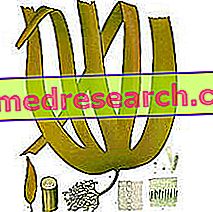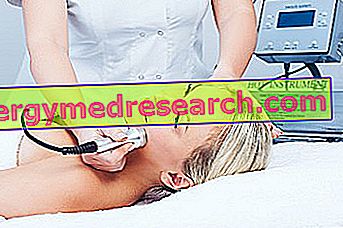Anal fissures are small lesions that affect the mucosa of the homonymous orifice.
They cause much discomfort and pain; they often bleed, particularly during the act of evacuating hard stools. A typical sign of anal fissures is the presence of live blood in toilet paper.

The presence of fissures in the innermost part of the anus can cause involuntary spasms which reduce the flow of blood causing chronicization.
We specify that fissures are NOT hemorrhoids and that they require a partially different pharmacological treatment (vasodilator and not vasoconstrictor).
What to do
Anal fissures are a widespread, but generally solvable malaise.
The remedies we are going to list become necessary only when the discomfort does not resolve spontaneously within a few days.
- If present, treat the infection.
- Avoid constipation: the advice for preventing / treating constipation is mainly food and behavioral.
- Avoid diarrhea: even recommendations for preventing / treating diarrhea are basically nutritional and behavioral.
- Practice warm baths and apply anesthetic ointments several times a day (even natural remedies): they are used to reduce pain and relax the muscles of the internal anal sphincter.
- Reduce stress and fear of evacuation: the remedies are pharmacological (anxiolytic) and behavioral (mental training, deep relaxation, etc.). In some cases, an excessive fear pushes the subject to postpone the defecation aggravating the constipation.
- Use of anal dilators: on medical advice, they can promote healing.
- Proctological surgery: it is a necessary remedy only in the most serious cases.
What NOT to do
- Ignore any infection.
- Neglecting constipation and not devoting the right time to the defecation phase. Striving too much is almost certain that fissures will arise or get worse.
- Exaggerate with laxatives and lead to diarrhea.
- Neglecting chronic diarrhea (for example, in the case of an irritable colon).
- Prevent personal hygiene and / or use very aggressive detergents that irritate the anus mucosa.
- Postpone evacuations for fear of pain; the following episode will certainly become more acute.
What to eat
For further information: Diet for the Anal Rinds
As anticipated, anal fissures have an etiology closely related to diet.
However, dietary therapy may vary depending on the case. If anal fissures are caused by constipation or diarrhea, nutritional corrections may be different.
- To regulate the intestine it is always useful:
- Take supplements based on probiotics and / or fermented foods: among the most suitable foods we recognize the functional ones (for example the added drinks) and all the others naturally rich in physiological bacteria (yogurt, buttermilk, tofu, tempeh, kefir etc).
- Take soluble fiber supplements: inulin, glucomannans, etc. It is important that these are supplements without insoluble fibers and osmotic laxatives.
- In case of constipation:
- Increase the amount of dietary fiber up to and above 30g / day; they are mainly contained in: vegetables, fruits, whole grains and legumes.
- Drink water for at least 1ml / kcal of energy in the diet: in the average person, about 1.8-2.0 liters per day.
- Guarantee a percentage of 25-30% of fats in the diet: they have a lubricating effect. Vegetable oils rich in anti-inflammatory molecules such as omega 3, vitamin E and polyphenols (linseed oil, kiwi oil, grape seed oil, walnut oil) should be preferred; also extra virgin olive oil.
- In case of diarrhea:
- It may be useful to follow a low residue diet, especially with regard to the percentage of insoluble fibers. On the contrary, the soluble ones have a gelling function that sometimes helps to improve the consistency. To learn more: Diet for Diarrhea
What NOT to Eat
- In the case of celiac disease, avoid gluten (contained in wheat, spelled, spelled, rye, oats and sorghum).
- In case of lactose intolerance, avoid milk and derivatives.
- Avoid alcohol: they tend to irritate the intestines and dehydrate the body. In the first case the diarrhea worsens and in the second the constipation.
- As a percentage of the total fibers, reduce the share of insoluble fibers: contained above all in bran, in the skin of legumes etc; may have adverse effects in case of diarrhea.
- Avoid irritating molecules (pepper, pepper, etc.) and nervini (coffee, cocoa, etc.).
- In case of diarrhea, avoid laxative foods: kiwi, beer, honey, broth, hot milk, peaches, licorice, tamarind, cassia etc.
- In case of constipation, avoid astringent foods: banana, lemon, medlar, tea, blueberries etc.
Natural Cures and Remedies
- Laxatives with laxative effect and emollient for oral use. They make the stool soft, flowing, reducing dilation and irritation / bleeding: Linseed, Psyllium and Inulin.
- Mallow, Plantain and Altea, always for oral use, as well as laxatives also work as anti-inflammatory and healing.
- Consolida, Aloe Vera Gel, Achillea Millefoglie and essential oils (lavender, cypress, sage, St. John's wort, thyme, centella asiatica and geranium): used as a decoction or in cream or in warm solutions (both for external use), they have anti-inflammatory, healing effects, antimicrobials, immunostimulants and anesthetics.
Pharmacological care
For further information: Medications for the treatment of anal fissures
The pharmacological remedies for the treatment of anal fissures are:
- Lidocaine: for example: Xylocaine, Lidofast, Luan CHIR. It is an anesthetic product for topical use, used in pain therapy for both anal and hemorrhoids. It is sometimes associated with steroids (hydrocortisone) with an anti-inflammatory function. These drugs are very useful when the pain interferes with intestinal peristalsis.
- Psyllium seeds: for example Fibrolax. It is a laxative that increases the fecal volume, to be used in the case of anal fissures caused by constipation. It is to be introduced orally in doses of 3.5g after meals, about 2 or 3 times a day for 2-3 days; requires drinking plenty of water.
- Nifedipine and Lidocaine: for example Antrolin. It is a cream for local use based on calcium channel blockers. It is applied in the rectum to relax the peripheral smooth muscle and is associated with Lidocaine. It should be applied twice a day for at least 6 weeks.
- Diltiazem: eg Cardizem. It works like the previous one and is used in association with corticosteroids.
- Nitroglycerin. Ointment (0.2-0.3-0.4%) for topical use. To be applied 2-3 times a day (even for 6 months) after a thorough cleaning.
- Trinitroglycerin: for example Rectogesic. It is a muscle relaxant indicated to reduce pain even in the most severe cases. Application is recommended every 12 hours for no more than three weeks.
- Botulinum Toxin: like Botox, Vistabex, Bocouture and Xeomin. Injecting these poisonous compounds a chemical denervation of a few months is obtained; this is useful in relaxing the muscles.
Prevention
The prevention of anal fissures is quite simple, even if subjectivity plays a fundamental role on the onset:
- Prevention of constipation:
- Diet rich in fiber and water.
- Regular life, not sedentary or frenetic, with the right time to devote to evacuation.
- Prevention of diarrhea:
- Avoid foods responsible for adverse reactions (gluten for celiacs and lactose for intolerant people).
- Avoid intestinal infections.
- Avoid alteration of intestinal bacterial flora.
- Avoid exceeding the laxatives.
- Take care of personal hygiene but do not overdo the aggressiveness of detergents.
Medical treatments
- Partial resection of the internal anal sphincter: simple intervention and with a stay of about a day; the complications are statistically irrelevant.
- Anuloplasty: it is also considered an easy intervention and the discharge occurs in about 24 hours; complications are rare. It is based on the coverage of the injured area bringing back flaps of skin taken in high body positions.



